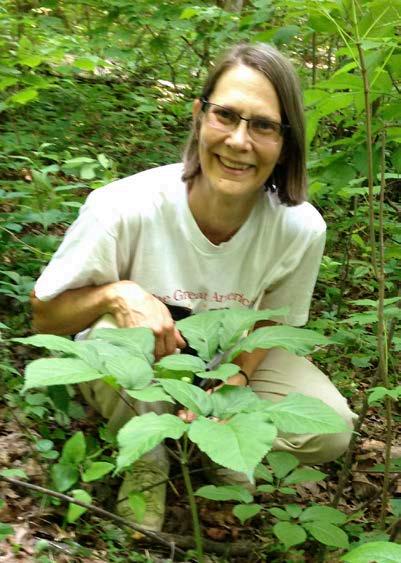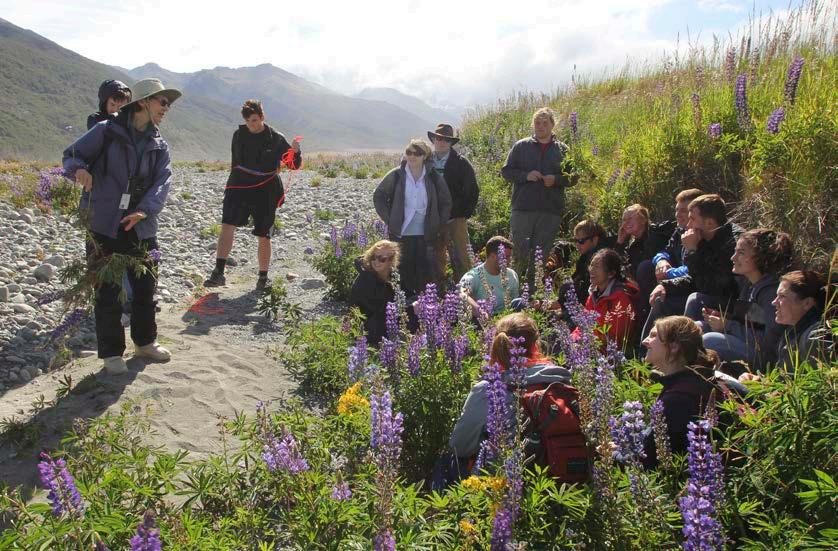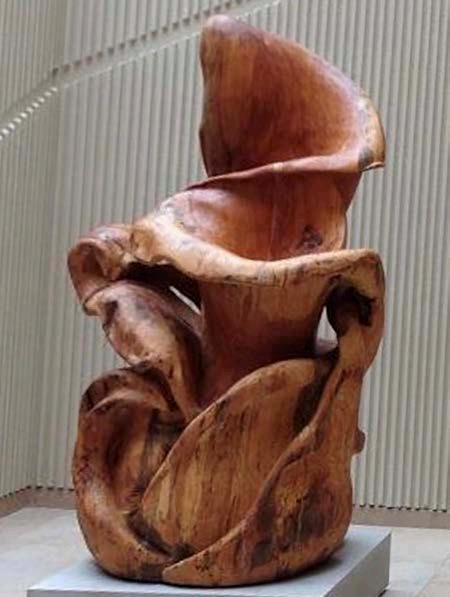
10 minute read
In Memoriam Anne Lubbers (1954–2022
Announcements
IN MEMORIAM
Advertisement
Anne in the field with a favorite plant. [Photo courtesy: Jim McGraw]
ANNE LUBBERS (1954–2022)
Maya Angelou wrote that when great souls die, “Our reality, bound to them, takes leave of us….” It has felt that way for many at Centre College with the unfathomable news that Professor of Biology Anne Lubbers had died. Surrounded by the love of her two sisters, Jane and Julie, and several of her close friends from Centre, she died on March 4, 2022 after a stroke.
A native of Wisconsin, Anne earned a B.S. from the University of Wisconsin-Green Bay, and her Ph.D. from Duke University. She
In Memoriam Mentions
We have learned of other recent passings of plant scientists; obituaries for these may appear in upcoming issues of the PSB .
Jon Giddens
Adriana Hoffmann
David Spooner
Gary Wallace came to Centre in 1993 and was teaching her last course, Plant Biology, before retiring from Centre. Her research on factors affecting seed production in wild ginseng has appeared in Ecology, American Journal of Botany, and The Canadian Journal of Botany, and numerous other publications.
Anne was a member of the Botanical Society of America, the Kentucky Native Plant Society, the Ecological Society of America, and the Southern Appalachian Botanical Society. She served on the board of the Kentucky Wildlife Refuge and took part in the Audubon Society’s annual bird count.
Among Anne’s proudest accomplishments was her work on the development of the environmental studies minor, now the ENS major. She was also on the committee that developed Centre’s natural science curriculum, and she taught NSC courses for years.
Anne’s love for the natural world stems from early walks in the woods near home with her sisters Jane and Julie and her brother John. 141
They’d explore until they’d find frogs and salamanders, examining every characteristic before returning them to their habitat. Early on, Anne could identify individual plants and birds, but she was fascinated by larger patterns and interactions as well. Anne and Jane believed it was significant that Jane became an artist and Anne an ecologist, each approaching the beauty of the world through a different lens; each one examining, interpreting, capturing, and sharing that beauty in unique but interconnected ways. When Anne found snake skins in the crawlspace of her home, she sent them to Jane as a potential medium for her artwork. Anne knew that art and science are sisters, and that made her the ideal biology professor for a liberal arts institution.
To some, it just made her delightfully odd. For office art, she had a framed picture of a hawk eviscerating a squirrel (using the verb literally here)—a picture she took on Centre’s campus in utter glee at this thrilling display of “nature, red in tooth and claw” (a reality she evaluated more positively than Tennyson).
Anne loved guiding her students in summer research projects with field work in plant biology and ecology.
“Anne Lubbers’ devotion to teaching and to her students was an essential aspect of all she did,” said Centre President Milton Moreland. “She especially enjoyed her summer research with students studying wild ginseng populations in Kentucky and showing students how exciting research could be. She will be deeply missed.”
In the classroom, her passion for the natural world was contagious. Cristin Palmer Rieskamp ’15 wrote: “Josh [’15] and I had BIO 110 with her our first year at Centre. One of our fondest memories is that during one lecture she got really excited about hornworts and she did this cute little dance when she described finding them. It was so pure.”
Meghan Langley ’04 graduated with a major in BIO and minor in ENS and went on to get a Ph.D. in wetland plant ecology. She credits Anne for being “the first person to introduce me to a love of native plants.” Professor of Biology Peggy Richey remembers Anne’s delight over an unusual dandelion root. “All scientists are curious,” Richey adds, “but Anne was in a league of her own. She was curious about everything—not just ‘nature’, but people, places, anything. This genuine curiosity made her unafraid to show delight, surprise, confusion, enthusiasm, whatever the emotion when she learned/saw/discovered something new.”
Anne was passionate about teaching in a close community of learning. Biologist Mike Barton served on the search committee that brought Anne to campus. “I remember the relief we felt when we realized that we had finally been rewarded with someone who really understood the mission of the college—someone who would go on to become one of our closest colleagues and friends.” Biochemistry colleague Stephanie Dew recalls, “One of my fondest teaching memories was when we team-taught biology Senior Seminar. Our teaching interests and areas of expertise could not be further apart, but we finally came up with a topic to suit us both: Carnivorous Plants and Blood-Sucking Animals. Only Anne would have done such a crazy topic with me. Her enthusiasm for all things plants, her love of teaching and her students, and her huge heart are going to be deeply missed.”

Anne Lubbers in New Zealand with Associate Professor of Biology Mark Galatowitsch’s class discussing invasive species. [Photo courtesy: Mark Galatowitsch]
Another signature course, Plant-Herbivore Interactions, shaped students’ ability to look at individual adaptations to larger patterns, an approach rooted in those walks in the Wisconsin woods. Mark Galatowitsch, her colleague in BIO and ENS, remembers, “Anne accompanied me in New Zealand when I taught my first study abroad course about invasive species. As a fellow ecologist she couldn’t resist contributing to lectures, student discussions, and helping with our research projects. Having her support made it a much richer experience for the students, but also for me.”
Anne’s innovative CentreTerm class on The Lawn examined the cultural significance of middle-class American yards, including a whimsical look at yard art in central Kentucky. But it was also a primer on the ecological dangers of monoculture. Her friends received such instruction outside the classroom. When I bought six Euonymus alatus plants (burning bush) for a small ornamental hedge on one side of my house, she was shocked that her patient instruction on invasive species had been for naught. There were words; I returned the plants. I once got home late for our planned evening at a restaurant and Anne had already arrived. I found her in my backyard, dressed for dinner, but uprooting honeysuckle plants along the fence. Lasting tributes to my dear friend include the many (native) trees I’ve planted in my yard and the wildflower meadow that replaced a fourth of the back lawn.
A tireless advocate for native plant landscaping, Anne turned her own property into a natural forest and wildlife refuge. On campus, the native plant garden adjacent to Young Hall presents a small model of her vision. Professor
of Biology Peggy Richey admired “the way she lived her life (no one recycles more than Anne), her home and landscape—all inspiring examples of living her values.” Chemistry Professor Joe Workman agrees: “I love that Anne lived her passion for sustainability in the car she drove, the materials she used to renovate her house, her solar panels, and the mug she brought to every on-campus function. She helped me to become a better person.”
She loved the campus canopy and used it as a branch of her classroom. Whenever new buildings were announced, Anne spoke for the trees. She spearheaded the “Regeneration” project that resulted in the sculpture near the central staircase of Young (pictured below), created from the majestic beech tree that once stood between Young and Crounse. In its place, three beeches were planted in front of Young. “Anne was not afraid to speak up and act,” Richey adds, “whenever she saw an opportunity to advocate for the natural world, for BIO and ENS programs that challenge students to explore all aspects of these disciplines, and for a campus that proactively ‘walks the talk’ about sustainability, environmental stewardship, and campus ecology. Her combination of passion and intellect was inspirational, and hard to beat as advocacy.” Workman adds, “Anne is probably in a Garden Paradise right now making plans to get rid of all of the non-native species.” But Workman was inspired by her approach: “Anne could be optimistic no matter how dark the situation. And when she saw a problem, she offered solutions instead of criticisms.”

Protector though she was, Anne once hit a tree behind Crounse with her car (and it was not invasive). Galatowitsch recalls that in New Zealand, “We did all our own driving, and the students who rode in her van fondly wrote “Lub Tub” in the dust on the side of the van. And they were still fond of her when she drove on the wrong side of the road.” Even in such instances, former Associate Dean Keith Dunn remembers, “Her willingness to laugh at herself, dust herself off, and keep getting better at simply being human—and this wonderful human had an amazingly generous spirit.”
That generosity of spirit made a difference for Anne’s colleagues—colleagues who became lifelong friends. She cared deeply about the Centre community and was as faithful and caring a friend as one could hope for. “From my first day at Centre, more than 27 years ago,” Dew says, “Anne has been my closest friend, professional colleague, and all-around sounding board.” Richey adds, “She was always there for people when they needed help, comfort, and a shoulder to cry on. Her compassion was deep and long-lived.”
She was a mentor to new colleagues, both formally and informally. Galatowitsch says that “she was an invaluable mentor for teaching, guiding student research, and how to serve our college.” Biology colleague Amanda Falk recalls that “Anne was always there, ready to answer a question or offer advice about courses or the campus or the natural world. She was always there to listen…. I thought she would always be there. Centre has lost more than just a professor. We’ve lost an activist for ecology and conservation, a mentor and supporter of students and new faculty members, and a genuinely kind soul who just cared so much.”
Workman admired that Anne “always kept striving to be a better teacher.” Colleagues noted that she was usually the first one in and the last one out of the office. Of course, as with all teachers, perhaps more is caught than is taught. Classics Professor Danielle LaLonde reflected, “My own love of the natural world is so much richer for her willingness to show me its beauty.” For Professor of Psychology Aaron Godlaski, Anne had been “a participant in the emerging connection to nature in my work, which pleased us both. That was Anne, always excited to share the love and knowledge of nature.”
And Anne was just fun. As Richey put it, “It made my heart sing whenever Anne laughed. She had a delightful sense of humor (I say that not just because she laughed at my jokes) and was quick to see the humor in just about any situation. What a gift her humor and laughter were.” She enjoyed hiking and exploring new places; loved holidays, movies, and desserts. She loved the Green Bay Packers and NPR. She adored being with family, and she adored her cats (named, of course, after famous ecologists). Recent graduate Cruz Avendaño-Dreyfus ’20 wrote that of all the notes in the book written to the class of 2020 in lieu of their postponed commencement, “Dr. Lubbers wrote the most impactful farewell. I’ve kept it above my desk and refer to it daily.” Anne would have wanted to say goodbye to us. So, I think it’s fitting to close this remembrance with Anne’s own parting words to the class of 2020, and to all of us:
“No matter what you encounter in the years to come, do not forget to look above at the sky and marvel at the clouds and the stars. Shift your gaze downward and discover the tiny organisms making a living in ways you had never imagined. Look about and note the individuality of every tree—the architecture of its branches, texture of its bark, venation of its leaves. All these things may be oblivious of us, but we do not need to be oblivious of them. This is what we belong to, and what grounds our sense of self.”
Anne now belongs to the earth and sky she so loved. And to our grateful memory. Farewell, dear friend.
By Rick Axtell, College Chaplain and Stodghill Professor of Religion
March 7, 2022
[Originally published at https://www.centre. edu/centre-college-mourns-anne-lubbersprofessor-of-biology/.]






